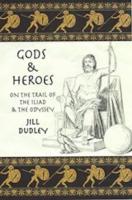
Orpington Publishers (2018) 168pp £7.99 (ISBN 9780955383472)
Many people have given themselves the pleasure of wandering around the Aegean with the classics in their pocket, but few have made a book from it. Jill Dudley has done this eight times now, as can be seen from her website page. Her format is similar each time: she and her husband Harry plan their holiday around key places which feature in the classical or biblical literature, and she describes their visit to each place, framed in the appropriate text. This time, the theme is Homer, and the quotations for each visit are taken mostly from the Rieu/Jones translation of the Iliad and Odyssey, although other sources are brought in when needed.
Jill’s drive (and it is very clear that she is the one who plans these trips) is to see the actual places which inspired `Homer’, and being there, to re-imagine the story. She doesn’t bother with the mythical landfalls in the Odyssey, only the real places mentioned: Troy itself, Ithaca, Pylos, Sparta etc. She does not trouble either over scholarly doubts about some of these places: she and Harry argue about which part of Ithaca has the site of Odysseus’ palace or whether Nestor’s palace was at Palaiokastro rather than the modern site, but do not question whether Ithaca itself can be Homer’s island, as many have doubted. She accepts without argument when the tourist guide at Troy points out the Skaian Gate or when locals direct them to Cheiron’s Cave, and that Homer was really born in Chios. But none of this matters, because every site visited, however inexact it may be, still helps to make the epic story come alive. They even, intrepidly, manage to climb two mountains, Ida (at the start of the journey) and Olympus (at the end), to get a sense of whether, and how, Zeus could overlook the world and see the plain of Troy.
It is a delightful book, light-hearted and quirky. The accounts of their efforts and tribulations in finding and getting to the various sites are very evocative and will trigger pleasant memories in anyone who has travelled in Greece or the eastern Mediterranean. Not just the sunshine and cicadas: the description of a sudden storm when they are on Mount Olympus shows vividly how Zeus could be imagined wielding his lightning bolts or gathering the clouds. Harry (not his real name and slightly invented, we learn from the website) is a sceptical, mildly irascible but always patient foil for Jill’s enthusiasms, provided he gets his daily swim. And there are anecdotes like this one, where their guide on Mt Ida is explaining Turkish courtship practices:
‘If a man fancies a girl he sees in the market…then he asks his mother to invite her family to take coffee with them…So the girl comes to the man’s family and she makes him coffee. If she gives him Turkish coffee with sugar in it, then it means she is interested in him. If the coffee has no sugar it means she will think about it. If he receives his coffee with salt in it then he knows her answer is no.’
A nice easy read and a good introduction to Homer, for schoolchildren certainly, and indeed for anyone who wonders what Homer is all about but hasn’t liked to ask.
Colin McDonald
